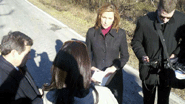Telecommunicator Spotlight: Julie Parker Uses Her Journalist Past to Find Success in Public Safety
When Julie Parker, 43, began her new job as the director of media relations for the Prince George’s County (Md.) Police Department (PGPD) on July 5, 2011, she brought with her a wealth of experience as a professional journalist. Holding a degree in broadcast journalism from the University of Maryland and having prior experience as a news anchor and reporter, Parker was ready to hit the ground running.
Hiring a professional journalist to lead the media relations department was a first for the police department, and it demonstrated a visionary approach by Chief Mark Magaw and Assistant Chief Kevin Davis, who believed Parker was the right person for the job. For the rank and file, her arrival was viewed with initial caution and skepticism because she was not from within the department nor was she a police officer.
“I didn’t know what to expect,” Parker says.
Parker began her career as a camera operator for C-SPAN, where she worked for four years; she was also a part-time producer at the time and covered the Republican National Convention in 1996. “I learned a lot about journalism there,” Parker says. Her first on-screen job was at WHAG TV in Hagerstown, Md., where she served as both an anchor and reporter. She then moved closer to Washington, D. C., and worked for News Channel 8 beginning in 1998. In 2002, Channel 8 merged with WJLA, and Parker became a full-time reporter. She worked for WJLA until June 2011, and she began working at PGPD on July 5, 2011.
As director of media relations for the police department, Parker faced new challenges, and she has faced them all head on. “It is different every day, just as reporting was,” says Parker. “All the challenges were new, which was appropriate. Learning how to give a sound bite was very different from getting a sound bite.”
Parker oversees a division that encompasses 12 people and includes the Crime Solvers Coordinator, the TV studio, special projects and graphics. There are four public information officers (PIO) who report to her, one media strategist and a police lieutenant.
Parker’s main priority is to disseminate the department’s good news. She attends weekly meetings, and if she hears something that strikes a nerve, she knows what a reporter needs to be able to tell the story. Parker does her best to pump out the good news to the media and the community.
Although many of her previous reporter colleagues were surprised she made the move to the police department, they also know she understands the issues, operates at a reporter’s pace and knows the meaning of deadlines. “I think it is critical to operate at the speed the media is operating,” Parker says.
Social media became her priority, and she is of the opinion that it saves time and money, and keeps the community informed. “I wanted to put stories on Twitter so journalists would find them. I have a healthy obsession with Twitter. I think it’s a valuable tool for the police department,” Parker says.
Although she is accustomed to dealing with stress and is under daily intense pressure in this job, she feels that it is to a lesser degree than what she experienced as a reporter. However, Parker keeps her Droid next to her head when she sleeps.
She is happy in her current position, and it allows her greater flexibility to have a personal life and enjoy time with her family. She has a large support system of friends and family. “I have a husband who is incredibly supportive of the job. I get to be home for dinner almost every night,” she says.
Married 12 years with two daughters, ages 5 and 9, Parker enjoys reading, dining out and travel. She also makes time to work out three times per week. She is in the gym by 5:15 a.m. on weekdays, and she does yoga on Sunday mornings.
Parker believes that one must be passionate about working in the public safety communications environment and care about the product being sold. “I’m selling the good work of this department. I’m managing the bad business that comes out of it. I think you have to be mentally prepared to work a lot of unusual hours. You can’t become a PIO or anything else without loving the news,” she says.
Parker is good at what she does because she knows what the media needs, she prides herself on being responsive, regardless of who is making the inquiry, and she is consumed by her work. Davis describes Parker’s effectiveness: “Julie has transformed our relationships with the media and, as a result, our community gets to see how effectively we fight crime and interact with our residents. Julie’s C-SPANing of the Prince George’s County Police Department, with her social media expertise, has put our agency on the national stage,” Davis says. Undoubtedly, Parker is playing a star role on that stage.
About the Author
Karen L. Bune serves as an adjunct professor at George Mason University and Marymount University in Virginia, and is a consultant for the Training and Technical Assistance Center for the Office for Victims of Crime and the Office of Juvenile Justice and Delinquency Prevention, U.S. Department of Justice. She is a nationally recognized speaker and trainer on public safety issues. Bune is Board Certified in Traumatic Stress and Domestic Violence, and she is a Fellow of The Academy of Experts in Traumatic Stress and the National Center for Crisis Management.


